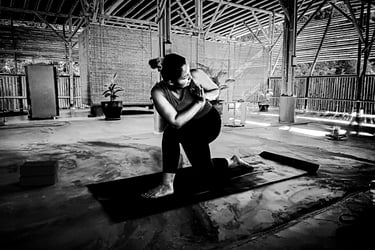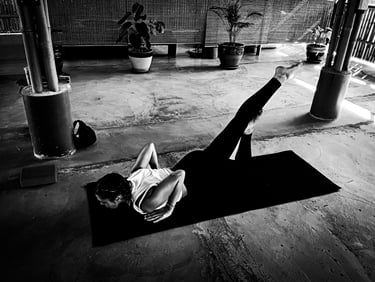Yoga: Tools Not Treatment
The nervous system, in an effort to protect us after trauma, can keep various muscle groups in a state of chronic contraction.
This heightened tension isn't limited to the hips and can manifest in the:
Shoulders and Neck: Leading to stiffness, headaches, and restricted movement.
Jaw: Causing clenching, jaw joints (commonly known as TMJ) issues, and even dental problems.
Spine and Back: Contributing to chronic back pain, poor posture, and limited flexibility.
Pelvic Floor: Potentially leading to dysfunction, pain, and issues with bladder or bowel control.
Diaphragm: Affecting breathing patterns and contributing to shallow breathing, which in turn can perpetuate the nervous system's heightened state.
Trauma (e.g. a road accident) often leaves the body in a constant state of alertness, with muscles - especially in areas like the hips - braced for action. The hips are often cited as a key area for holding stress due to their role in grounding and movement, making them symbolic "containers" for unresolved stress.
So, when we say stress is "stored," it’s more about how the nervous system and muscular system interact, rather than implying that stress (or emotions) physically reside in a specific body part.
By promoting relaxation we help shift the nervous system from a sympathetic (fight or flight) state towards a parasympathetic (rest and digest) response. This transition allows the body to gradually release chronic tension.
Practices such as deep breathing and mindful movement provide the body with signals of safety, helping to break long-held patterns of bracing and holding.
It's the body's way of 'bracing' for perceived threat, even when the immediate danger has passed. Understanding this helps us see why approaches that focus solely on stretching or strengthening might not fully address chronic pain or stiffness if the underlying nervous system tension isn't also considered.
While yoga can be a valuable tool in trauma recovery, it is not a standalone solution and should be part of a broader, holistic approach to healing. Yoga can help individuals develop body awareness, regulate their nervous system, and build resilience, but it is not a replacement for other evidence-based therapies like talk therapy or trauma-focused treatments.




More Insights
